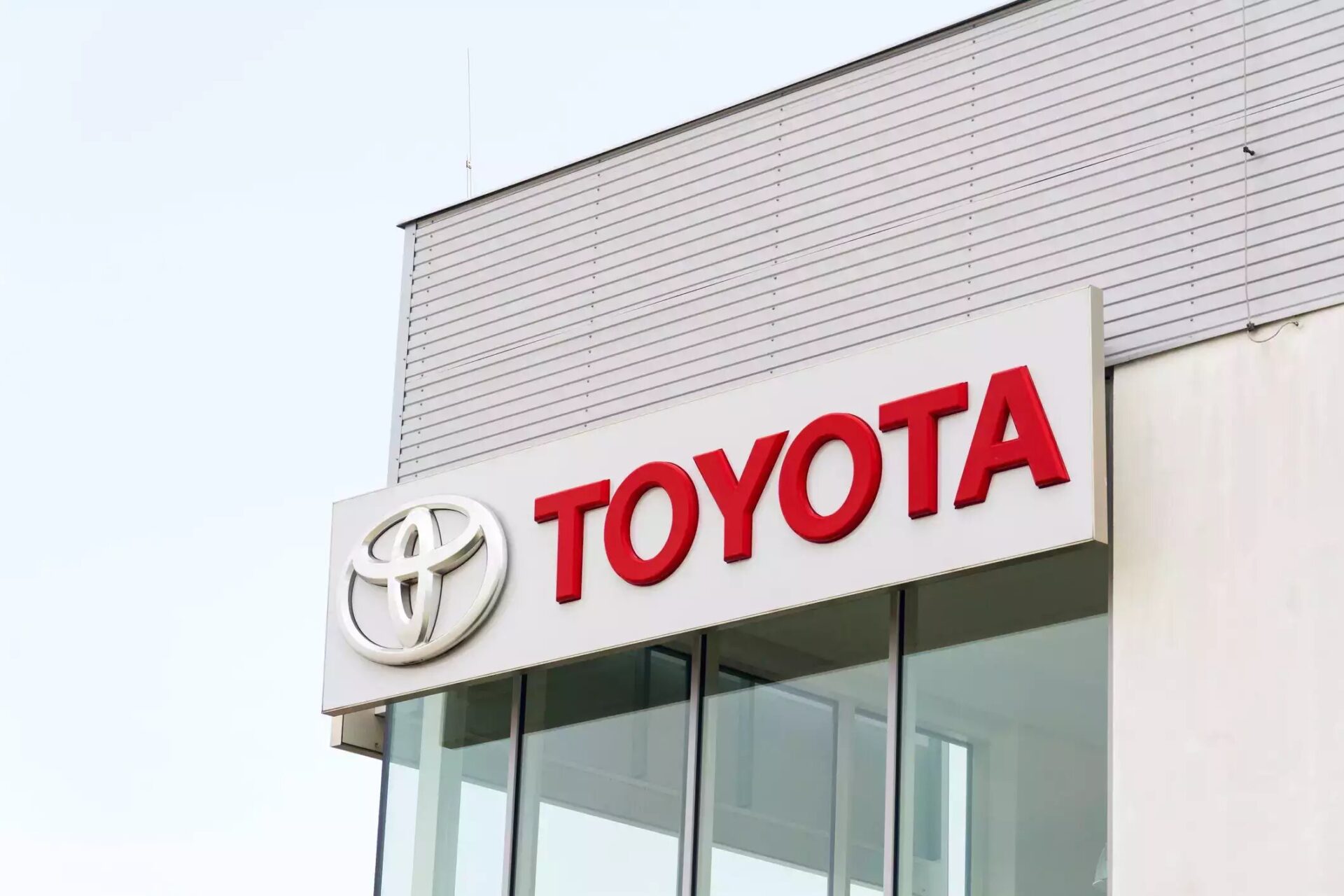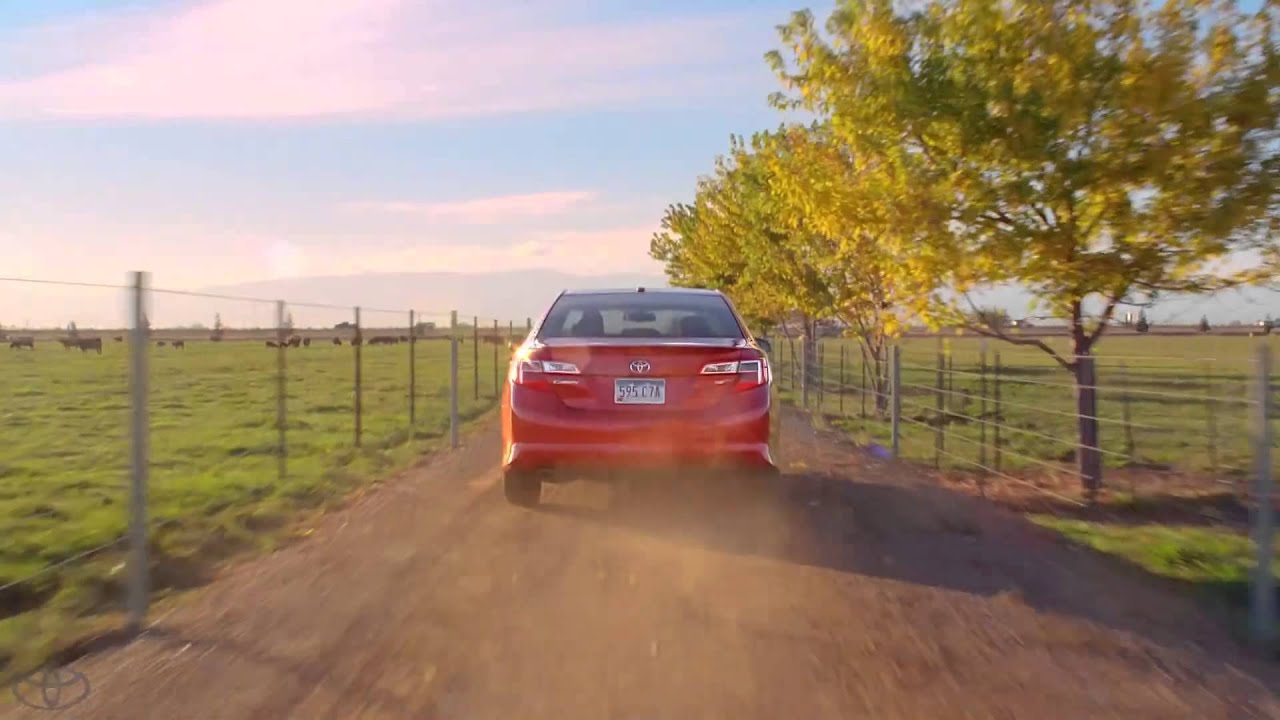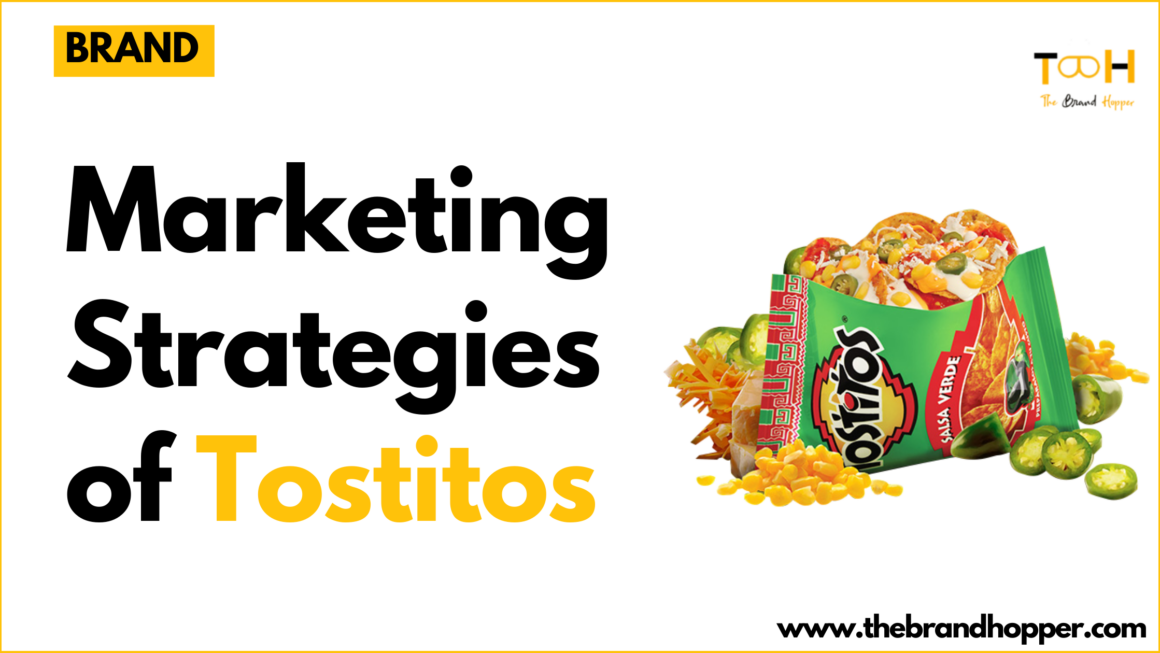Toyota Motor Corporation (Toyota Jidosha Kabushiki Kaisha) is a Japanese multinational automotive manufacturer headquartered in Toyota, Aichi, Japan. It is the world’s largest automaker by sales and production, and the ninth-largest company in the world by market capitalization. In this article, delve into Toyota Marketing Strategy driven by quality, innovation, and customer engagement in the ever-evolving automotive landscape.
Toyota’s roots trace back to the textile machinery business of the Toyoda family, which gradually transitioned into the automotive sector under Kiichiro Toyoda’s visionary leadership. The launch of the A1 prototype in 1935 marked the company’s entry into the automobile manufacturing arena, and this determination culminated in the establishment of the Toyota Motor Corporation in 1937. This foundation laid the groundwork for Toyota’s legacy, marked by a commitment to lean manufacturing, continuous improvement, and a customer-centric approach.

Toyota revolutionized the automotive industry by introducing the Toyota Production System (TPS), often referred to as “lean manufacturing.” Developed by Taiichi Ohno and Eiji Toyoda, TPS emphasized minimizing waste, streamlining processes, and ensuring the highest possible quality in production. The result was an agile and efficient manufacturing process that allowed Toyota to offer high-quality vehicles at competitive prices, setting new industry standards and inspiring other industries to adopt similar principles.
The company was one of the pioneers in introducing hybrid technology to the mass market with the launch of the Toyota Prius in 1997. This marked a significant shift towards more sustainable and environmentally friendly transportation solutions.
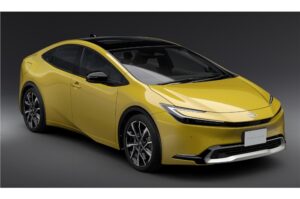
Today, Toyota is a global company with manufacturing plants in over 50 countries. With manufacturing plants and operations spanning across the world, Toyota has become a truly global company. It has established a strong presence not only in its home country of Japan but also in markets spanning North America, Europe, Asia, and beyond. Toyota’s commitment to local communities extends beyond business operations, as the company actively engages in corporate social responsibility initiatives, including education, environmental sustainability, and disaster relief efforts. The company sells cars, trucks, buses, and other vehicles under the Toyota, Lexus, and Daihatsu brands.
Toyota is a major force in the global economy. The company’s products are sold in over 170 countries, and it employs over 360,000 people. Toyota is committed to providing safe, reliable, and efficient vehicles to its customers around the world.
Toyota’s journey is a remarkable testament to the fusion of innovation, quality, and enduring success. From its humble beginnings, the company has risen to become a global leader by embracing lean manufacturing principles, fostering innovation, and maintaining a steadfast dedication to its customers. As Toyota continues to navigate the ever-changing landscape of the automotive industry, its legacy as a driving force of excellence remains unwavering.
Marketing Strategies of Toyota
Toyota has established its brand as a symbol of quality, reliability, and innovation. Behind this success lies a series of strategic marketing approaches that have helped Toyota capture market share, build customer loyalty, and maintain a strong global presence. Let’s delve into the intricate web of Toyota’s marketing strategies, uncovering the tactics that have propelled the company to the forefront of the automotive industry.
Customer-Centric Approach
Central to Toyota’s marketing philosophy is a customer-centric approach that prioritizes understanding and meeting consumer needs.
Here are some of the ways Toyota implements a customer-centric approach:
-
Listening to customers: Toyota conducts regular surveys and focus groups to get feedback from its customers. This feedback is used to improve the company’s products, services, and marketing campaigns.
-
Personalizing the experience: Toyota offers a variety of ways for customers to customize their vehicles, such as choosing colors, features, and accessories. The company also offers a variety of customer service options, such as online chat and 24/7 roadside assistance.
-
Building relationships: Toyota employees are encouraged to build relationships with customers. This can be done by getting to know customers’ needs and wants, and by providing them with excellent service.
-
Going the extra mile: Toyota is known for going the extra mile to satisfy its customers. For example, the company offers a warranty that covers most repairs for the first 3 years or 36,000 miles.
-
Genchi Genbutsu: This is a Japanese term that means “go and see for yourself.” Toyota employees are encouraged to go to the source of problems and see them for themselves. This helps to ensure that the company is providing the best possible customer service.
-
Kaizen: This is a Japanese term that means “continuous improvement.” Toyota is constantly looking for ways to improve its products, services, and processes. This helps to ensure that the company is meeting the needs of its customers now and in the future.
-
The Toyota Way: This is a set of principles that guide Toyota’s business practices. The principles emphasize customer satisfaction, continuous improvement, and respect for people.
Explore The Toyota way document here
Toyota’s customer-centric approach has helped the company to become one of the most successful automakers in the world. The company has a loyal customer base that is willing to recommend Toyota products to others.
Emphasis on Quality and Reliability
Toyota’s reputation for producing reliable vehicles with exceptional quality serves as a cornerstone of its marketing strategy. The company’s commitment to delivering vehicles that exceed customer expectations has led to a strong brand loyalty and positive word-of-mouth marketing.
Toyota has always emphasized quality and reliability in its vehicles. This emphasis on quality and reliability has helped Toyota to become one of the most successful automakers in the world.
Here are some of the ways Toyota emphasizes quality and reliability:
-
The Toyota Production System (TPS): The TPS is a set of principles that Toyota uses to improve its manufacturing processes. The TPS emphasizes quality, efficiency, and waste reduction.
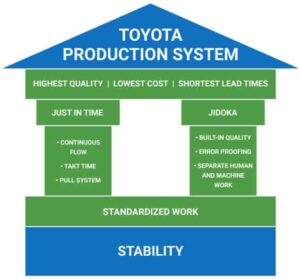
-
Jidoka: This is a Japanese term that means “automation with a human touch.” Jidoka is a system that allows machines to stop automatically if they detect a problem. This helps to prevent defects from being produced.
-
Andon: This is a Japanese term that means “signal.” Andon is a system that allows workers to signal for help if they need it. This helps to ensure that problems are addressed quickly.
-
Kaizen: This is a Japanese term that means “continuous improvement.” Toyota is constantly looking for ways to improve its products, services, and processes. This helps to ensure that the company is meeting the needs of its customers now and in the future.
-
TQM: This stands for Total Quality Management. TQM is a philosophy that emphasizes quality in all aspects of a business. Toyota uses TQM to ensure that its products are of the highest quality.
-
Long-term testing: Toyota vehicles are subjected to rigorous testing before they are released to the public. This testing helps to ensure that the vehicles are reliable and durable.
-
Use of high-quality materials: Toyota uses high-quality materials in its vehicles. This helps to ensure that the vehicles are built to last.
-
Well-trained employees: Toyota employees are well-trained in the manufacturing and maintenance of Toyota vehicles. This helps to ensure that the vehicles are built and maintained to the highest standards.
Toyota’s emphasis on quality and reliability has helped the company to build a reputation for producing reliable and durable vehicles. This reputation has helped Toyota to attract customers and build brand loyalty.
Innovation and Technological Leadership:
Toyota’s focus on innovation has been a key driver of its marketing success. The company has consistently introduced cutting-edge technologies, from hybrid propulsion systems to advanced safety features and autonomous driving capabilities.
Here are some of the ways Toyota has been innovative:
- The Toyota Production System (TPS): The TPS is a set of principles that Toyota uses to improve its manufacturing processes. The TPS emphasizes quality, efficiency, and waste reduction.
- Hybrid vehicles: Toyota was the first automaker to mass-produce hybrid vehicles, such as the Prius. Hybrid vehicles combine a gasoline engine with an electric motor to improve fuel efficiency.
- Self-driving cars: Toyota is one of the leaders in the development of self-driving cars. The company has been testing self-driving cars on public roads for several years.
- Fuel cells: Toyota is also developing fuel cell vehicles, which use hydrogen to power an electric motor. Fuel cell vehicles produce zero emissions, making them a more environmentally friendly option.
- Advanced safety features: Toyota is also a leader in the development of advanced safety features, such as automatic emergency braking and lane departure warning. These features can help to prevent accidents and save lives.
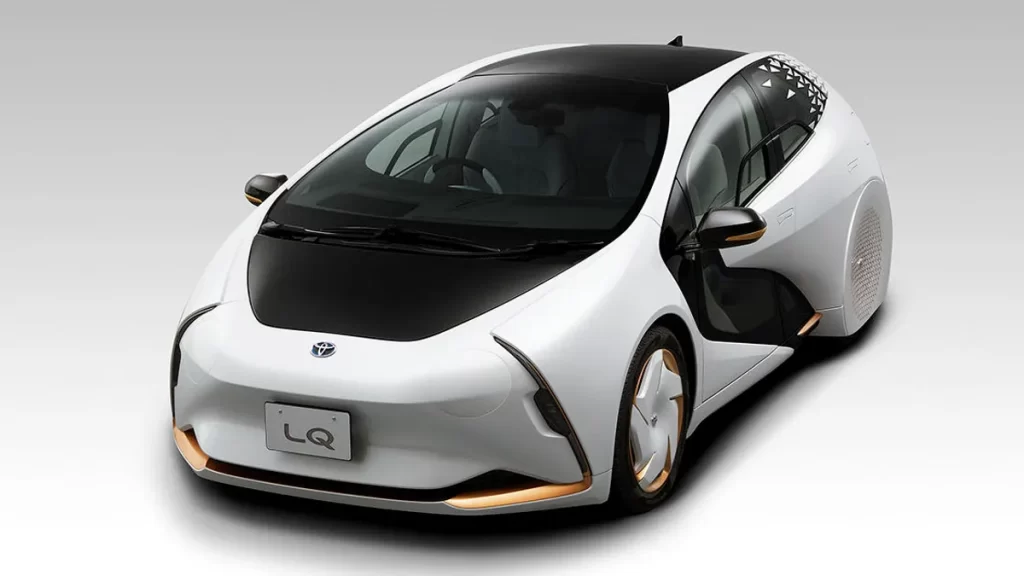
Toyota’s commitment to innovation has helped the company to stay ahead of the competition and to meet the needs of its customers. The company is constantly looking for new ways to improve its products and services, and to develop new technologies that will make transportation more efficient and environmentally friendly
Building a Diverse Portfolio
As part of its marketing strategy, Toyota has built a diverse portfolio of vehicles to appeal to various segments of the automobile industry. Here are some examples of how Toyota caters to distinct markets through its range of offerings:
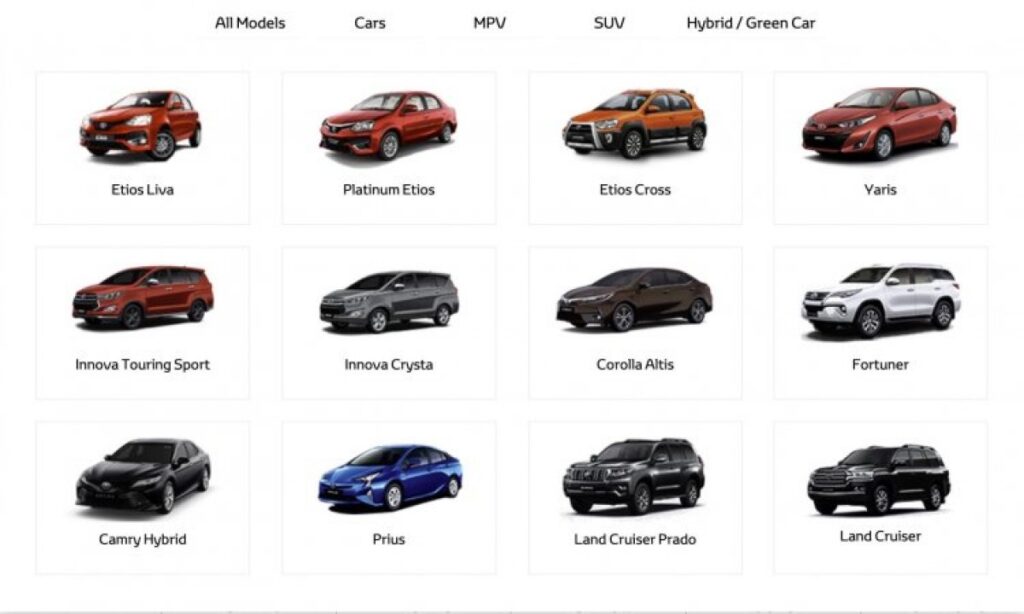
Sedan/Hatchback Lineup:
Toyota offers a wide selection of compact, midsize, and full-size sedans and hatchbacks designed for families and individual commuters seeking practicality, comfort, and efficient gas mileage. Models include the Corolla, Camry, Yaris, Prius, and C-HR.
SUV/Crossover Range:
For those looking for versatility and capability in all weather conditions, Toyota provides an array of sport utility vehicles (SUVs), crossovers, and trucks. Examples include the 4Runner, Highlander, Tacoma, Tundra, Sequoia, Land Cruiser, and Lexus LX.
Electric Vehicles:
In recent years, Toyota has expanded its lineup to include electric vehicles (EVs) targeting environmentally conscious consumers. The Prius Prime plug-in hybrid and bZ4X concept EV illustrate Toyota’s commitment to developing eco-friendly transportation solutions.
Performance Vehicles:
The Scion brand was created specifically to attract younger generations interested in customization and performance modifications. Later, Toyota introduced the GR sports car series, featuring the Supra and MR2 Spyder revivals, along with the GT86 coupe and iA sedan. These models cater to enthusiasts seeking engaging driving dynamics and eye-catching designs.
Commercial Fleet Solutions:
Toyota offers purpose-built commercial vehicles tailored for business applications, such as the Sienna van, Tundra pickup, and Hino buses. These models accommodate specific operational needs and help companies optimize their operations efficiently.
Connected Car Technology:
Toyota incorporates cutting-edge connectivity features into its vehicles, enabling seamless integration between smartphones, voice commands, navigation systems, and over-the-air software updates. This technology evolution keeps Toyota ahead of its competitors.
Toyota’s diversified portfolio reflects its commitment to meeting evolving customer needs by offering innovative products across various categories. From affordable commuter cars to rugged off-road adventure machines, Toyota strives to provide options for every type of driver or family. Its dedication to continuous improvement and adaptation helps ensure long-term success in today’s rapidly changing automotive landscape.
Strong Digital Presence and Engagement
In the modern age of digital connectivity, Toyota has embraced various online platforms to engage with customers. The company leverages social media, interactive websites, and digital advertising to create meaningful interactions with its target audience.
The company uses a variety of digital channels to reach its target audience, including:
- Website: Toyota’s website is a comprehensive resource for information about the company’s products, services, and sustainability initiatives. The website also features a blog, a social media hub, and a customer service portal.
- Social media: Toyota is active on a variety of social media platforms, including Facebook, Twitter, Instagram, and YouTube. The company uses social media to connect with customers, share news and updates, and promote its products and services.
- Email marketing: Toyota uses email marketing to stay in touch with customers and promote its products and services. The company sends out regular emails with news, updates, and special offers.
- Online advertising: Toyota uses online advertising to reach its target audience on a variety of websites and apps. The company’s ads are tailored to the interests of the people who see them.
- Content marketing: Toyota creates and shares content that is relevant to its target audience. This content can include blog posts, infographics, videos, and white papers. The goal of content marketing is to educate and inform customers about Toyota’s products and services.
Toyota’s strong digital presence and engagement has helped the company to reach a wider audience and to build relationships with customers. The company’s digital marketing efforts have also helped to increase brand awareness and to drive sales.
Emotional Branding and Storytelling
Toyota often creates touching advertising spots that focus on themes like family bonding, community building, and personal growth. For instance, “Let’s Go Places” and “You Can’t Compromise Passion” campaigns feature relatable scenarios and uplifting music to capture viewers’ hearts and minds. These emotional appeals strengthen consumer loyalty and reinforce Toyota’s reputation as a trustworthy companion during life’s journeys.
Toyota has excelled in emotional branding by creating narratives that resonate with consumers on a personal level. Through advertisements and campaigns that evoke feelings of nostalgia, family, and aspiration, the company forges emotional connections with its audience. These stories go beyond the features of the vehicles and tap into the deeper emotions and values of potential buyers.
Moreover, as a global sponsor of the Olympics since 1970, Toyota associates its brand with excellence, determination, and unity. Through inspiring ad campaigns and activations at major events like the World Cup and Paralympics, Toyota taps into people’s passion for competition and human achievement while positioning itself as a supporter of athletic greatness worldwide.
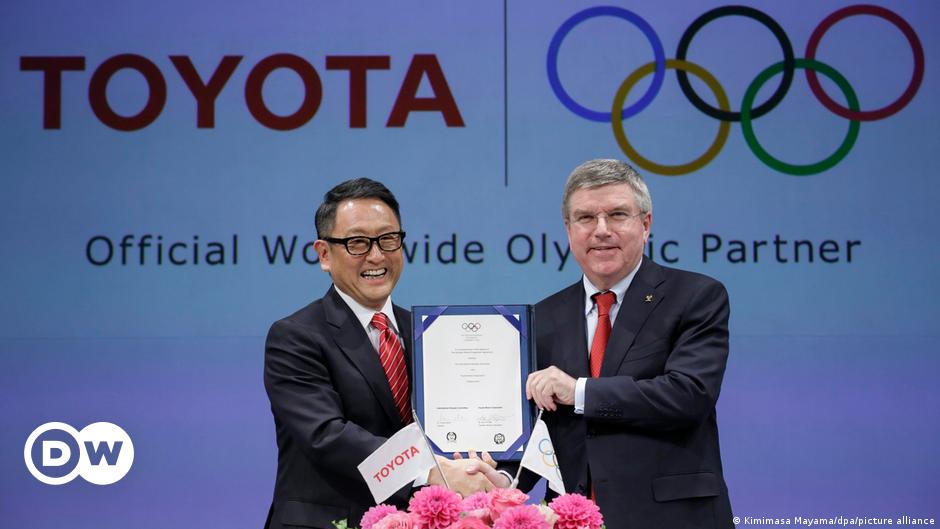
In conclusion, Toyota’s marketing strategies are a masterclass in aligning customer needs, quality, innovation, and sustainability. By focusing on the customer, showcasing technological advancements, emphasizing quality and reliability, and diversifying its portfolio, Toyota has maintained its position as a global automotive leader. Through emotional branding, digital engagement, and community involvement, the company continues to drive success while embracing the evolving landscape of the automotive industry.
Also Read: The Toyota Way: How Company Became Global Automotive Giant
To read more content like this, subscribe to our newsletter

